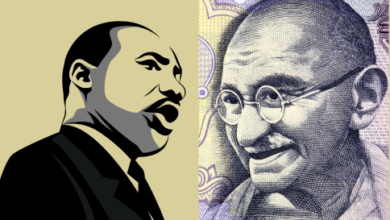Recently, while deep-digging the interwebs for my PhD, I ran across an article entitled The Kids are Alt-Right (Quietus). In it, the author, Tim Burrows, asserts that much of today’s hard right-wing ideology — the kind that drove the January 6 seditionists to the U.S. Capital, ripped Britain out of the EU, helped Hillary elevate Trump in the Pied Piper power-play flop, and keeps Q-anon awash in tinfoil and pizza sauce — was actually conceived in the Summer of Love, 1968. How dare he.
Burrow’s observations piqued my punk-roots. As a red blooded Gen-Xer I’ve maintained a healthy skepticism of the Boomer brigades. My petulant go-to anecdote: after Woodstock the flower-powered woke up hungover, took a bath, put on a suit and turned into angry bankers. 12-Step recovery circles call this ‘dry-drunk syndrome’, with ‘stinkin’ thinking’.
In my pursuits as a playwright and essayist, I’m cautious. An East Village acquaintance, Quentin Crisp, used to say “Never run with the masses. There’s danger in numbers.” I concur. I’ve said many prayers in the temple of Allan Bloom — in my view, the American mind finally closed shop on November 4th, 1980. Further, Arthur Miller’s Death of a Salesman — exposing for many the American pipe dream — remains germane and relevant. To say we were ‘warned’ is a bit garish. I prefer: we were informed. But just like today, with climate change is anyone listening?
Red, white & the blues.
I’ve been researching 1960s counter-culture — specifically a short-lived anomaly that was the London Drury Lane Arts Lab. I’m not interested in the peddling of the MTV bullshit factories — peace, love, cock & bull. I seek things of merit, like in the research of 60s Scottish psychotherapist R. D. Laing — who promoted psychotropics as treatment for schizophrenia, and only now the medical establishment is taking the work seriously. Some of what was once dismissed as heresy now brings hope (ask any cancer patient about the benefits of cannabis for pain relief). This peroneus approach yields a slightly different palette than the bog-standard Anglo narrative of the time.

The British roots of the 1960s avant-garde go back further than in the USA. The British swing to the sixties began with the Campaign for Nuclear Disarmament in November, 1957. An early member, Gerald Holtom, designed the original peace sign, which was carried the next year as the banner for the first annual CND Easter Aldermaston march, fifty-two miles to London. In contrast to some of the counterculture message-confusion that would be prevalent in the following decade, the CND galvanized around a clearly-defined, common purpose.
In addition, 1950s-60s Britain was a country beginning to use a prescient system of managed socialism to improve its post-war predicaments. The subsequent policies of economist John Maynard Keynes – a managed-market approach, and the bold parliamentary initiatives in the arts of Jennie Lee, a Scottish working-class woman who became the first U.K. government Minister of the Arts — make good reading for the Bernie Sanders crowd. Next time.
The reasons to draw these connections are peculiar in the primarily Anglo-Saxon dominated ‘special relationship’ between the US & UK. In the 50s-60s it is arguable that Britain provided a platform for the emergence of a new counter-culture at the time — which ironically, general twentieth century British culture seemed to accept as part of the day to day machinations of society. While they may not like a given polemic, they are grudgingly happy to engage it.
“In an age of increasing automation bringing more leisure to more people than ever before, both young and old will increasingly need the stimulus and refreshment that the arts can bring. If one side of life is highly mechanised, another side must provide for diversity, adventure, opportunities both to appreciate and to participate in a wide range of individual pursuits. An enlightened Government has a duty to respond to these needs.” – Jennie Lee, A Policy for the Arts, UK Parliament, 1965.
Across the Atlantic, by contrast, the wakes of the Red Scare and the cultural carnage ham-fisted McCarthy wrought made Americans not as confident in their status-quo, or amused with being challenged. This is demonstrated in the unfortunate violence surrounding the black civil rights movements, Kent State protests, Stonewall riots, and later at the 1968 Democratic National Convention massacre (a sentiment most recently replicated in the brutal crackdown of Occupy Wall Street by Obama’s F.B.I.).
Therefore, 1960s counter-culture agitation was a special kind of blasphemy to the Yankee Doodle establishment. It became the enemy, arguably spawning new culture wars. In his play Rock ‘n’ Roll, Tom Stoppard illuminated this within the brutal game of tag played between the Soviet Russian authorities and counter-culturists in the occupied Czechoslovakia. To paraphrase: the police (authorities) love the heretics (counterculturists, protestors) they give meaning to the defenders of the faith. Hence in America, the glorious pursuit of God, greed and guns persists. Fast-forward fifty short years and what we have, in part, is a that the British have perfected the craft of co-opting dissent, while the Americans have perfected the alchemy of outrage.
Britain sneezes, America gets the flu.
The Cambridge Analytica scandal and its purveyors like Alexander Nix, inventor of ‘Lock Her Up’ and a lot of Trump’s misinformation playbook emanated (and continues to do so under another name) from London. In between this demonically electronic polarity of yen-yang culturism, a new, ever-more insidious evil has been allowed to emerge as social media. The seedy toilet walls of yesteryear now exist on Twitter and Facebook. Unchecked, unverified, unmitigated to spread disinformation far and wide under the banners of free speech & free market profiteering. Politicians don’t understand it, they fear it. A situation Edward Bernays, the original deceptor-in-chief, could only dream of for the Anglo-speaking West. The pawns: old people who are afraid to die; young people who don’t know how to live for fear of missing out. All the while Zuckerberg & Co. gloat in our faces on the way to the bank.
About 2007 or so, I saw Jools Holland interview Elvis Costello on the BBC. Holland asked Costello what’d changed in the music business. Costello replied “I never thought music would be intentionally used to divide the generations the way it is today”. This stuck with me. Seems that before, younger generations used ‘their music’ to distinguish themselves, not break off entirely. Perhaps this a clue in support of Burrows’ assertion that the ‘fight the establishment” mantras of the 60s counterculture have been at best culturally morphed, at worst intentionally hijacked. What better way to create legions of young, generally self-centred egocentrics to hide in safe spaces away from prying eyes of parent, teacher or care-giver to serve as perfect mass-consumers? How naïve was Bloom to merely fear the Walkman.
Tune In, Dumb Down
I recall c. 1979, sitting in my combined English- History ninth grade classroom at Eastway Jr. High. Each day, for the first hour, Mrs. Bland (her real name) a sweet, caring African- American woman taught us to read, spell, and think in complete sentences. In the second hour, Mr. Thompson, a slightly eccentric historian who wore the thick, black-rimmed Coke bottle glasses he’d been issued by the military in the Korean war, taught us dates, times, places and world events that helped us know our place in the world.
One day, we filed into the red-brick classroom as usual and took our seats. At the front of the class stood some school board Betty, with a rolling cart filled with brand new obnoxiously coloured books. My table-partner, Jay, whispered over to me in our signature out-ofturn voice “what’s going on?” I noticed Mrs. Bland nervously looking down at her desk, avoiding eye contact with most of us, as if she’d been shamed. Mr. Thompson stood way back, arms folded, grimacing.
Once seated, Betty Bureaucrat took over, telling us to remove the protective covers our Moms had made from paper grocery store bags for our English and History books. She went around the room snatching up our old books, then around again to flop down two new ones. ‘English’ was henceforth proclaimed ‘Language Arts’, ‘History’ dubbed ‘Social Studies’. From then on, we stopped learning. Unless you count silly word games and the social mating habits of baboons “learning” for a bunch of kids that couldn’t yet balance a chequebook, or fully grasp the sacrifices our grandparents made on their June, 1944 vacation in Normandy. Or the truths behind the American Revolution, a hard-fought break from said British Royal bullshit.
To this day, I seethe at the implications of my first childhood scrape with perverted Postmodernism. “Good intentions pave the road to hell” my Grandma Ruby used to say. Well, folks, perhaps we’re there. Two generations later, the gap between rich & poor has never been greater. We argue over pronouns, Bible verses, trigger warnings and safe spaces. The generations are at war, and Pollyanna cannot be challenged, debated or engaged in civil discussion.
What James Baldwin and William F. Buckley eloquently demonstrated at the Cambridge University debates in 1965 would now be considered ‘offensive’ by too many universities (especially the ones that draw public funds). To disagree is to be damned and/or cancelled. Language Arts begets language lawyers. Far Left: “Destroy the Patriarchy!” Far Right: “Drain the Swamp!” No matter. No difference. Goebbels would be pleased. McMedia is profitable. How nice for those who get a kick out of gunning down unarmed civilians, punching a “TERF”, or dropping bombs on Syria, Yemen or Palestine. We arguably play right into this with every casual epithet.
Somewhere long about 1989 I was invited by my friend Marilyn to a yoga class at the Integral Yoga centre on West 13th Street — long before the Madonnafication of the practice. It was a parlour of counter-culturists who’d at least tried not to drink the Wall Street kool aid. The founder of the place championed a saying that’s stuck with me “Where the mind goes, the body will follow”. Over the past thirty years, I’ve found it to be absolutely true.
Using Burrow’s theory, and Swami Satchidananda’s yoga aphorism, it’s not a far stretch to assert that Boomer-hippies, Woke – Lefties and alt-Right Millennials share a common tongue. In both cases, the antiestablishment rhetoric reaches a fevered pitch. “Tune in, Drop out” takes on a whole new meaning when you look at what almost happened at the Capital Riots on January 6th, and what is happening on all sides now. We have a noise problem.
Alarming to me are the common expressions, the “street language” that’s being hoisted upon us from phone, computer, podcast and television network — and seconded by a McHollywood claptrap. ‘Defund the police?’ How about: Defund the Press.
I am pained to hear my students and other younger people use terms like ‘killed it’, ‘slayed’, and ‘destroyed’ to describe something they’ve done well at; succeeded; or accomplished. Really? The language of violence, the language of war. We have to change this.
Let it begin with me.
After 1800 words here, I don’t have big lofty solutions. Noise begets more noise. However, of late I am becoming more and more convinced that the smallest, deliberate, quiet actions have the potential of great effect. Rosa Parks, or Alan Turing style.
The easy one: refuse violent war language. If I succeeded in this article, I didn’t “kill” or “slay” anything. I did a good job. If someone disagrees and writes it up, they didn’t do a “takedown” or “destroy” me. They engaged healthy debate. No one actually “nails” anything, they achieve.
Second, recognize the sound of propaganda, and refuse it. The obnoxious fad of the last couple of decades has been to use the insipid ‘Valley Girl’ inflections of speech. Every sentence ends in a flippant upswing of tone. This, mixed with either the rattling gravel-voice, or off-the-teeth baby talk – which also emanates from the far West coast — makes for abrasive listening. It’s not cute, funny or trendy. It’s marketing.
Finally, stop buying war. If a movie promo begins with that deep voiced man saying “IN A WORLD…” I’m out the door. Bombs, explosions, flames, annihilation, end of the world, kill the bad guy… Again: Where the mind goes, the bodies will follow.
One 60s term I love is “vibe”. Short for vibration, of course. In 2003, scientists confirmed what the yogis, buddhas, monks and meditators have known for 6,000 years: the universe vibrates in the universal tone of a Bflat.
Shall we join in the chant, or keep shouting at each other?
Martin Belk is an expat New Yorker, author of the memoir and eponymous play: Pretty Broken Punks: Lipstick, leather jeans, a death of New York (2012 Polwarth), former producer of Squeezebox! NYC, is currently writing a PhD on the London Drury Lane Arts Lab. martinbelk.com






